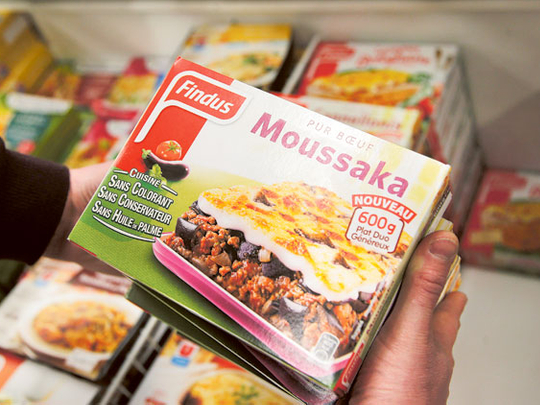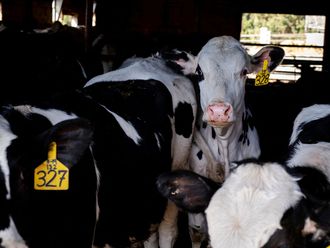
Dubai: European agricultural and food ministers will meet in Brussels on Wednesday to see just what can be done to rein in the growing horse meat scandal.
So far, frozen products containing horse meat have been found in stores or linked to food processing companies in Ireland, Britain, Poland, France, Spain, Cyprus, Luxembourg, the Netherlands and Romania — with the prospect that the scandal will spread further as more distributors and marketers check their products.
Yesterday, officials at Abu Dhabi Food Control Authority confirmed to Gulf News that they were carrying out checks in the UAE but would not be commenting just now.
At the centre of the scandal is a fraud that has seen horse meat introduced into the supply and manufacturing chain in place of beef — a straight swap that few consumers have noticed — but lucrative for the criminal enterprise behind the sophisticated scheme.
“Beef sells for around €4 (Dh19.26) a kilo, while horse meat costs no more than 90 cent,” Dr Patrick Wall, a professor in public health at University College Dublin told the Irish Times yesterday.
“So what we are seeing here is fraud on an absolutely huge scale. And the people behind this fraud would have been making enormous sums of money.”
Officials in Ireland first detected the horse meat during an inspection of a beefburger-processing plant two weeks ago. It manufactures beef patties for supermarket chains across the British Isles. Inspections of the burgers in those chains were found to contain some 60 per cent of horse meat, Now frozen lasagne from Findus that was marketed as containing 100 per cent beef actually only contained horse meat.
The horse meat scandal follows hard on the heels of a revelation that processed burgers also contain “pink slime” — fatty beef by-products treated with an ammonium hydroxide spray to kill off bacteria and pathogens and maintain a bright red colour.
British supermarket chain Tesco said on Monday its value range of spaghetti bolognese contains more than 60 per cent horse meat. Staff had already removed the Everyday Value range from stores because they had been supplied by the same company, Comigel, who made the tainted Findus lasagne.
In France, the country’s six main supermarket chains withdrew Findus and other products made by Comigel, the French food company at the heart of the scandal. Picard, a chain specialising in high-quality frozen foods, said it had pulled two lasagne and bolognese products similar to those produced under the Findus label, and sent samples for analysis. The two products were manufactured by Comigel at its factory in Luxembourg.
Experts within the horse slaughter industry say there is evidence that both Polish and Italian mafia gangs are running international scams netting millions of euros to substitute horse meat for beef during food production. The bait-and-switch horse meat scam has worked before — in 2003, cured horse meat was found in salamis sold as beef products.
Comigel claims it sourced its meat from Romania, which has been subjected to export restrictions due to the prevalence of the viral disease equine infectious anaemia in the country. Spanghero, the French company that supplied the meat for the Findus beef lasagne, announced it will also sue its Romanian suppliers.
Yesterday, Romania’s Agriculture Minister Daniel Constantin said there’s no indication that the meat mislabelling was done in Romania.
—With files from agencies












